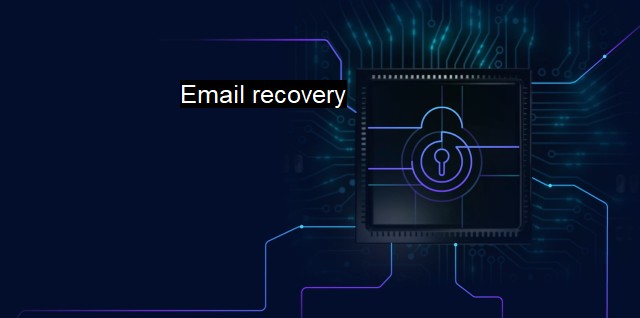What is Email recovery?
The Significance of Email Recovery in Cybersecurity: Understanding the Causes, Methods, and Importance of Email Data Recovery
Email recovery, with plays an integral role in complementing the overall protection strategies that organizations deploy for their safety. The process entails retrieval of messages, contacts, attachments, and other forms of vital data that users might unintentionally delete, lose due to accidental formatting, logical or mechanical failure, virus attack or damage as a result of malware. professional email recovery tools help individuals or businesses recover lost or forgotten passwords to protect against data breaches and hack attempts.One of the central truths about modern-day cybersecurity is that email forms one of the globally accepted apps that cyber villains overwhelmingly sync their efforts towards. Hence, the importance of email recovery becomes essential, as the damage resulting from email-related misdemeanors, fraud, and security threats can be cataclysmic. Emails are the primary delivery mechanisms for phishing attacks, ransomware, and malware spread across networks, and the delivery cover for malicious actors who target businesses.
When emails and their metadata face compromise due to these attacks, they can lead to a disruptive loss of data. Cybersecurity methodologies must include email recovery to counteract these losses, preserve business continuity, and maintain robust security measures. Email recovery thereby reduces the vulnerability of an individual or organization and safeguards critical information by restoring the lost data.
With the advent of cloud and AI technologies, email recovery tools are evolving and becoming more efficient at retrieving old deleted emails, missed contacts, damaged storage, etc. If the emails are permanently deleted or purged, they fragment into numerous small chunks dispersed around the hard disk. Now, using advanced algorithms, these tools search, identify, and piece together these email fragments. Post-recovery, these tools also mend the divided file data to its original structure and secure it for reuse.
On another level, email recovery serves password recovery purposes. Suppose the user has forgotten the password or the email account has been compromised. In these situations, email recovery tools confer the ability to recover encrypted or forgotten passwords and secret questions from most primary web browsers.
With regards to antivirus, the best email recovery tools also scan for virulent codes or malware infections in the recovered data. This layer of infection scan precludes the chances of restoring a corrupt or infected file successfully. It maintains an organization's cybersecurity integrity, ensuring that recovered data will not pose threats down the line.
Users must also remember that recovering an email does not necessarily mean that the attackers cannot access it. Because emails traverse many servers before reaching the recipient, each of these nodes is susceptible to breaches. Therefore, apart from recovery, businesses must also focus on email encryption, spam filtering, and efficient antivirus programs.
They must also adopt a proactive approach towards protecting their emails and reinforcing their security systems. Training users to identify and avoid potential phishing scams, enforcing strict access management, and conducting regular audits will prevent attacks. Such practices, coupled with state-of-the-art email recovery tools, will provide the most comprehensive protection.
Achieving swift and efficient email recovery requires setting up preemptive measures like regular backups and using email system providers with robust recovery tools. As a result, even when data loss occurs amidst an unfortunate attack, organizations can shorten their recovery time dramatically.
Conclusively, email recovery is a crucial cybersecurity aspect every organization should invest in, fortifying their defence against ever-evolving cyber threats and bolstering their prophylactic and reactive response. In today's volatile digital landscape, email recovery isn't just an adjunct service but a necessity for the survival and resilience of any organization. By reconnecting organizations to their vital data, email recovery bolsters cyber robustness, proving vital in a world prone to continuous data-based threats.

Email recovery FAQs
What is email recovery?
Email recovery is the process of restoring deleted or lost emails from an email account. It involves retrieving email data that has been removed or lost due to various reasons such as malware, system crashes, or accidental deletion.What are the common reasons for email loss or deletion?
Several factors can cause email loss or deletion. These include malware attacks, accidental deletion, account hacking, system crashes, and software bugs.Can antivirus software help in email recovery?
Yes, antivirus software can help with email recovery by scanning for malware that might have caused email loss or deletion. Some antivirus programs also have email recovery tools that can retrieve lost data from infected email accounts.How can I prevent email loss or deletion in the first place?
To prevent email loss or deletion, you should regularly backup your emails and install reliable antivirus software to protect your email account from malware attacks. Avoid clicking on suspicious links or opening attachments from unknown senders. Furthermore, make sure to double-check before deleting any emails to avoid accidental deletions.| | A | | | B | | | C | | | D | | | E | | | F | | | G | | | H | | | I | | | J | | | K | | | L | | | M | |
| | N | | | O | | | P | | | Q | | | R | | | S | | | T | | | U | | | V | | | W | | | X | | | Y | | | Z | |
| | 1 | | | 2 | | | 3 | | | 4 | | | 7 | | | 8 | | |||||||